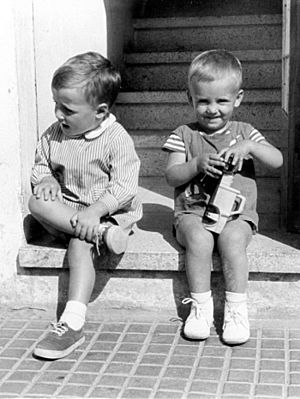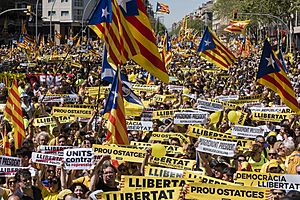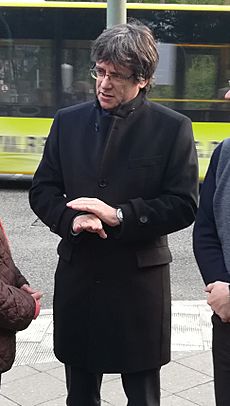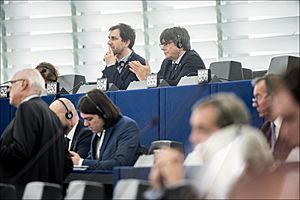Carles Puigdemont facts for kids
Quick facts for kids
Carles Puigdemont
|
|
|---|---|
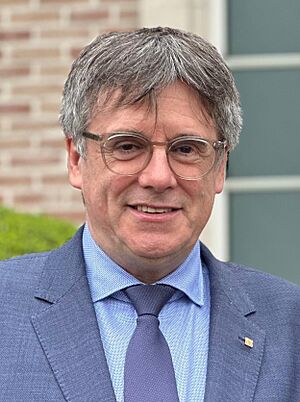
Puigdemont in 2024
|
|
| President of Together for Catalonia | |
| Assumed office 27 October 2024 |
|
| Preceded by | Laura Borràs |
| In office 9 August 2020 – 4 June 2022 |
|
| Preceded by | Office established |
| Succeeded by | Laura Borràs |
| 130th President of the Government of Catalonia | |
| In office 12 January 2016 – 27 October 2017 |
|
| Monarch | Felipe VI |
| Vice President | Oriol Junqueras |
| Preceded by | Artur Mas |
| Succeeded by | Direct rule (Quim Torra from 17 May 2018) |
| Member of the European Parliament for Spain | |
| In office 2 July 2019 – 15 July 2024 |
|
| Member of the Parliament of Catalonia | |
| Assumed office 10 June 2024 |
|
| Constituency | Barcelona |
| In office 17 January 2018 – 30 July 2018 |
|
| Constituency | Barcelona |
| In office 10 November 2006 – 27 October 2017 |
|
| Constituency | Girona |
| Mayor of Girona | |
| In office 1 July 2011 – 11 January 2016 |
|
| Preceded by | Anna Pagans |
| Succeeded by | Albert Ballesta i Tura |
| Member of the Municipality Council of Girona | |
| In office 11 June 2007 – 11 January 2016 |
|
| Personal details | |
| Born |
Carles Puigdemont i Casamajó
29 December 1962 Amer, Catalonia, Spain |
| Political party | Junts (since 2020) |
| Other political affiliations |
|
| Spouse |
Marcela Topor
(m. 2000) |
| Children | 2 |
| Residence | Waterloo, Belgium |
| Occupation |
|
| Signature |  |
Carles Puigdemont i Casamajó (born 29 December 1962) is a politician and journalist from Catalonia, Spain. He has been the President of Together for Catalonia (Junts) since October 2024. He also held this role from 2020 to 2022. From 2016 to 2017, he was the 130th President of the Government of Catalonia. During his time as president, his government held a vote on independence for Catalonia. This led to a declaration of independence that was not successful, and he was removed from his position. He then served as a Member of the European Parliament (MEP) from 2019 to 2024.
Carles Puigdemont studied in Amer and Girona. In 1982, he became a journalist, writing for local newspapers. He became the editor-in-chief of El Punt. He also directed the Catalan News Agency from 1999 to 2002. From 2002 to 2004, he directed Girona's House of Culture. His family supported Catalan independence. Puigdemont became involved in politics as a teenager, joining the Democratic Convergence of Catalonia (CDC) in 1980. This party later became the PDeCAT. In 2006, he stopped journalism to focus on politics. He was elected as a member of the Parliament of Catalonia for the Girona area. In 2007, he was elected to the Municipality Council of Girona. In 2011, he became Mayor of Girona. On 10 January 2016, he was elected the 130th President of the Government of Catalonia. This happened after an agreement between the Junts pel Sí (JxSí) alliance and the Popular Unity Candidacy (CUP).
In September 2017, the Catalan Parliament approved laws for an independence vote. They also approved a legal plan for a new republic if the vote supported independence. On 1 October 2017, the Catalan independence referendum took place. This happened even though the Constitutional Court of Spain had suspended the laws. Some voting places were closed, and there were reports of police using force. About 43% of Catalan citizens voted, and 92% of them supported independence. The Catalan Parliament declared independence on 27 October 2017. As a result, the Spanish government took direct control of Catalonia. They removed Puigdemont and the Catalan government. The Catalan Parliament was dissolved, and new elections were held. Puigdemont and other members of his government faced legal challenges. Puigdemont went to Belgium to avoid arrest if he returned to Spain. In the regional elections on 21 December 2017, Puigdemont's party, Together for Catalonia, came in second. Catalan parties supporting independence kept a small majority of seats. Puigdemont asked for new talks with the Spanish Prime Minister, Mariano Rajoy, but these were rejected.
Puigdemont stayed in Belgium to avoid arrest in Spain. On 25 March 2018, he was stopped in Germany. He was released on bail while courts decided on his case. On 10 July 2018, a Spanish Supreme Court judge suspended him from the Catalan parliament. On 12 July 2018, a German court decided he could be sent back to Spain for some financial matters, but not for more serious political charges. Puigdemont's legal team said they would appeal. On 19 July 2018, Spain withdrew the arrest warrants against Puigdemont and other Catalan officials. He was elected as a Member of the European Parliament in 2019. In March 2021, the European Parliament voted to remove his special protection as an MEP. On 23 September 2021, he was arrested in Sardinia, Italy, based on an old arrest warrant. After one night, he was released without special conditions. His special protection as an MEP was given back by the European Court of Justice in May 2022.
Contents
Early Life and Family Background
Carles Puigdemont was born on 29 December 1962 in Amer. This is a village in the province of Girona in north-eastern Catalonia, Spain. His father, Francesc Xavier Puigdemont i Oliveras, was a baker. His mother was Núria Casamajó i Ruiz. Carles is the second of eight brothers. His family has a long history in Amer. His grandfather started the Pastisseria Puigdemont bakery in 1928. The family still owns this bakery today. Puigdemont's great-grandfather and his uncle Josep Puigdemont were mayors of Amer. They, along with Puigdemont's father, supported Catalan independence.
Puigdemont went to school in Amer. When he was nine, he went to a Church-run boarding school in Girona. There, he learned in Spanish. By age 16, he was already a reporter for the Diari de Girona newspaper. He wrote about football and other news.
As a teenager, Puigdemont went to political meetings with his uncle Josep. He also helped start the Nationalist Youth of Catalonia. In 1980, he joined the Democratic Convergence of Catalonia (CDC). This was a conservative political party that supported Catalan identity.
After school, Puigdemont started studying Catalan philology at the University College of Girona. However, he left to become a journalist. In 1983, at 21, Puigdemont was in a car accident. He was seriously hurt and has a small scar on his face.
Journalism Career
In 1982, Puigdemont started working as a journalist for El Punt. This was a newspaper that supported Catalan independence. He worked his way up to become the paper's editor-in-chief. He also wrote a weekly column for Presència magazine. He is a member of the Catalan Journalists Association.
Starting in 1988, Puigdemont began collecting information about Catalonia in international newspapers. This led to his 1994 book, Cata... què? Catalunya vista per la premsa internacional. This means "Cata...what? Catalonia as seen by the foreign press." In the 1990s, Puigdemont took a year off to study how different countries in Europe handled language policies.
Because of his interest in new technologies for news, he helped create the Catalan News Agency (ACN). This agency was started by the Generalitat de Catalunya in 1999. Puigdemont also founded Catalonia Today, a magazine in English. He was the director of ACN until 2002. Then, he became the director of the Girona cultural center, the Casa de Cultura. He held this job until 2004.
Political Career
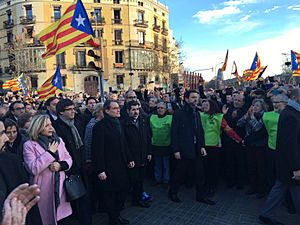
Puigdemont stopped journalism to focus on politics in 2006. The Convergence and Union (CiU) group asked him to be a candidate for the Parliament of Catalonia. He ran in the 2006 regional election for the Province of Girona. He was elected. He was re-elected in the 2010, 2012, and 2015 regional elections. For the last one, he was part of the Junts pel Sí (JxSí) group.
Puigdemont also ran in the 2007 local elections in Girona. He was elected, but his party remained in opposition. In the 2011 local elections, Puigdemont was re-elected. His party ended the Socialists' 32-year control in Girona. Puigdemont became Mayor of Girona. He was re-elected in the 2015 local elections. He was also a leader in the Association of Municipalities for Independence. In July 2015, he became its chair.
On 10 January 2016, Puigdemont was elected the 130th President of Catalonia. This happened after an agreement between pro-Catalan independence parties. He resigned as Mayor of Girona the next day. This is because a person cannot be both a regional president and a municipal mayor at the same time. He was the first president of Catalonia to choose not to take an oath of loyalty to the Spanish constitution and the Spanish monarch.
Catalan Independence Vote
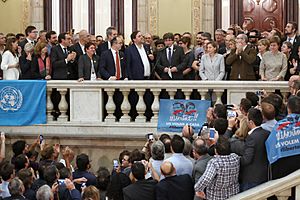
In June 2017, Puigdemont announced that the Catalan independence referendum would be held on 1 October 2017. The Catalan Parliament passed a law on 6 September 2017. This law allowed the vote to happen. The next day, the Constitutional Court of Spain stopped the law, blocking the vote. The Spanish government tried to stop the vote and arrested some Catalan officials. Despite this, the vote went ahead. However, many people who did not support independence did not vote. Only 43% of people voted, and 92% of them supported independence. About 900 people were hurt as the Spanish police tried to stop the voting.
On 27 October 2017, the Catalan Parliament declared independence. Opposition members of parliament did not take part in this vote. Almost immediately, the Senate of Spain used a special rule from the constitution. This rule removed Puigdemont and the Catalan government. It also put Catalonia under direct rule from Spain. The next day, Spanish Prime Minister Mariano Rajoy dissolved the Catalan Parliament. He called for new regional elections on 21 December 2017. Puigdemont and other members of the Catalan government faced legal challenges.
Puigdemont and five other Catalan ministers went to Belgium on 30 October 2017. Puigdemont said he went to "the capital of Europe" to speak freely and safely. He stated he would not return to Spain unless he was guaranteed a fair trial.
Life in Belgium and Germany
On 3 November 2017, a Spanish judge issued European Arrest Warrants for Puigdemont and others. This happened after they did not go to a court hearing in Madrid. On 5 November 2017, the five politicians went to the Belgian police. After a long hearing, a Belgian judge released them on bail. They were told not to leave Belgium without permission. On 5 December 2017, the Supreme Court of Spain withdrew the European Arrest Warrant against Puigdemont and the others. However, the judge warned that national arrest warrants were still active. This meant they could be arrested if they returned to Spain.
Catalan Elections
While still in Belgium, Puigdemont ran in the 2017 regional election. He was a candidate for the Together for Catalonia (JuntsxCat) group. He was re-elected to Parliament. In this election, parties supporting Catalan independence kept a small majority in the Catalan Parliament. After the election, Puigdemont asked for new talks with the Spanish government. He said he would meet Rajoy outside of Spain. Rajoy refused, saying he would only talk to the leader of the Catalan government in Spain.
On 1 March 2018, Puigdemont hoped to be chosen as President of Catalonia again. But the Catalan Parliament followed warnings from Spain's courts and delayed the meeting. Puigdemont then said he was no longer trying to be re-elected as leader of Catalonia. Later, he announced a new organization called "Council of the Republic."
Arrest in Germany
On 25 March 2018, Puigdemont was stopped in Germany near the Danish border. He was arrested because of a European warrant that had been reissued. On 5 April 2018, a German court ruled that Puigdemont would not be sent back to Spain for the most serious political charges. He was released on bail. He had to report to the police once a week and could not leave Germany without permission.
After his release, Puigdemont asked Spain's government to release Catalan supporters from prison. He also asked for talks with them.
On 12 July 2018, the German court confirmed that Puigdemont could not be sent back for the most serious political charges. However, he could still be sent back for financial matters. Puigdemont's legal team said they would appeal any decision to send him back. In the end, Spain withdrew its European arrest warrant. This ended the attempt to send him back. Puigdemont was free to travel again and chose to return to Belgium.
In January 2019, Puigdemont filed a legal request against the president of the Catalan parliament. He argued that his political rights were denied. This was because he was not allowed to vote from Belgium after his legal issues.
European Parliament Elections
Puigdemont was the top candidate for the Lliures per Europa list in the 2019 European Parliament election in Spain. He was elected as a member of the European Parliament. However, he did not attend the required ceremony in Madrid to become an MEP. Because of this, the European Parliament initially said he could not be an MEP. Puigdemont and another politician, Toni Comín, challenged this decision.
On 20 December 2019, Puigdemont was officially recognized as an MEP. This happened after a ruling from the European Court of Justice.
Puigdemont and Comín attended their first European Parliament session on 13 January 2020. They were not part of any main political group. Puigdemont's first speech was about the right of people to decide their own future. They asked to join the Greens–European Free Alliance group. However, they later withdrew their request.
Arrest in Italy
On 23 September 2021, Puigdemont was arrested at the Alghero–Fertilia Airport in Italy. This happened after he got off a flight from Brussels. The arrest was due to a Spanish Supreme Court arrest warrant from 2019. The day after his arrest, he was released without any special conditions. He had planned to meet with local officials and Sardinian independence supporters. He also planned to attend a cultural event in Sardinia.
His arrest brought Puigdemont back into the spotlight in Catalan politics. One day after his release, he announced he would attend a court hearing in Sassari on 4 October.
Return to Spain
On 8 August 2024, Puigdemont returned to Spain. This was after seven years of living in Belgium. He gave a speech at the Arc de Triomf in Barcelona. In his speech, he spoke about Catalonia's right to decide its own future. He then quickly disappeared into the crowd. "Holding a referendum is not and will never be a crime," Puigdemont said. The Catalan police set up roadblocks. An officer whose car was reportedly used in Puigdemont's escape was arrested. This raised questions about police involvement. This event happened around the time Salvador Illa became the new Catalan president. This marked a change in the region's political focus. Puigdemont's return and disappearance made the political situation more complex. Some opposition leaders criticized the event, saying it harmed Spain's image.
Beliefs and Views
Puigdemont was one of the founders of the youth group for the Democratic Convergence of Catalonia (CDC). He has always been a strong supporter of Catalan independence within the party. As mayor of Girona, he supported policies that encouraged economic freedom.
In 2017, Puigdemont described the European Union (EU) as a "club of old and outdated countries." He also said it was "controlled by a small few." He suggested that Catalonia should be allowed to vote on leaving the EU if its people wanted to. While he supports the EU and the euro, he believes "we should work to change it." He has said he does not like an EU that does not protect human rights and the right of people to be represented. He has said he is not "europhobic" (afraid of Europe). Instead, he calls himself and his party "euro-demanding," meaning they want more from Europe.
In May 2024, Puigdemont noted that Spain had recognized Palestine but not Kosovo. He pointed out that the European Union has diplomatic relations with Kosovo. He also said that Spain helped Turkey "to suppress the Kurds." Puigdemont stated that "Above all, Spain is the country that suppressed the democratic referendum of Catalonia" on 1 October 2017.
Personal Life
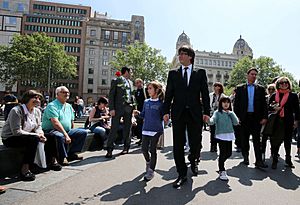
Puigdemont married Romanian journalist Marcela Topor in 2000. They have two daughters, Magali and Maria. They live in Girona. He can speak Catalan, English, French, Romanian, and Spanish. Puigdemont supports Girona FC and FC Barcelona football clubs. He also plays rock guitar and the electric piano. As a teenager, Puigdemont played bass in a rock band for a short time around 1980.
On 2 February 2018, the Belgian town of Waterloo confirmed that he had rented a house there. He planned to make it his official home.
Images for kids
See also
 In Spanish: Carles Puigdemont para niños
In Spanish: Carles Puigdemont para niños
 | Janet Taylor Pickett |
 | Synthia Saint James |
 | Howardena Pindell |
 | Faith Ringgold |


